AI is an unstoppable force transforming the workplace, reshaping job roles, and redefining how tasks get done. On one hand, it’s unleashing a wave of innovation and creating unprecedented opportunities across various sectors. On the other, it’s also stirring anxiety about job security, particularly in roles susceptible to automation. The reality is that AI is weaving itself into the fabric of work, altering the dynamics and expectations within the workforce.
The impact of AI is especially profound in industries like healthcare, pharmaceuticals, and manufacturing. Consider how AI is revolutionizing healthcare by analyzing vast data sets at lightning speed to enhance patient care. Or look at pharmaceuticals, where AI-driven drug discovery accelerates timelines and unveils new possibilities. High-tech manufacturing is being streamlined, with AI enhancing quality assurance and operational efficiency. These changes are not just about implementing advanced tools; they signify a shift towards a more connected, data-driven ecosystem.
This transformation is a double-edged sword. On one level, AI is slated to create 20-50 million new jobs by 2030, according to various projections. Positions like data analysts, AI programmers, and machine learning specialists are cropping up, demanding a hybrid skill set combining technical prowess with business insights. Yet, as AI flourishes, sectors heavily dependent on repetitive tasks face significant disruption. It’s here that the discussion of job displacement becomes unavoidable, sparking debates about the future of work.
In the face of such dramatic changes, professionals across all fields must brace themselves for the inevitable—and adapt. Continuous learning isn’t just a buzzword; it’s a survival strategy in this new AI-driven landscape. Tech skills, once the purview of engineers and IT specialists, are becoming essential across job roles. Upskilling and reskilling are no longer optional; they’re necessary for staying relevant. The notion of a lifetime career in a single field is quickly fading as workers must pivot and evolve to meet new demands.
But let’s not pretend this transition is seamless or without its challenges. The ethical implications of AI are a pressing concern. Bias in AI systems poses real risks, potentially reinforcing societal inequalities. Data privacy is another major hurdle; as AI systems grow more powerful, so does the need to safeguard personal information. These issues must be addressed head-on to ensure that AI advances equitably and responsibly.
The stakes are high, reflecting a delicate balance between embracing AI to push boundaries and protecting the workforce from its potentially disruptive effects. Gratefully, history shows us that businesses and individuals are remarkably adaptable. Employers must spearhead initiatives to foster a culture of continuous learning and skill development. Meanwhile, employees should take proactive steps to enhance their capabilities, preparing themselves to work alongside AI rather than being replaced by it.
In the grand scheme, the net gain of 58 million jobs by 2025 underscores AI’s positive potential. However, it’s not just a numbers game. The quality of jobs created, the skills required, and the working environment will determine whether AI becomes a trusted ally or a feared adversary in the workplace. By nurturing a healthy dialogue around AI’s ethical use, promoting equitable access to opportunities, and committing to lifelong learning, we can direct the course of AI integration towards one that is inclusive and forward-thinking.
If you’re navigating this new terrain, embrace it with open eyes and a curious mind. Dive into learning opportunities, whether online courses, workshops, or mentoring programs. Engage in discussions around AI ethics, ensuring that your voice contributes to shaping a future that aligns with collective values. How are you preparing yourself or your team for an AI-enhanced workplace? Share your insights and let’s explore strategies for adapting and thriving in this era of unprecedented change.

